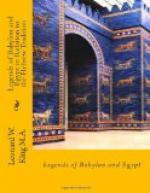When we turn to the text itself, it will be obvious that the story also is very primitive. But before doing so we will inquire whether this very early version is likely to cast any light on the origin of Deluge stories such as are often met with in other parts of the world. Our inquiry will have an interest apart from the question itself, as it will illustrate the views of two divergent schools among students of primitive literature and tradition. According to one of these views, in its most extreme form, the tales which early or primitive man tells about his gods and the origin of the world he sees around him are never to be regarded as simple stories, but are to be consistently interpreted as symbolizing natural phenomena. It is, of course, quite certain that, both in Egypt and Babylonia, mythology in later periods received a strong astrological colouring; and it is equally clear that some legends derive their origin from nature myths. But the theory in the hands of its more enthusiastic adherents goes further than that. For them a complete absence of astrological colouring is no deterrent from an astrological interpretation; and, where such colouring does occur, the possibility of later embellishment is discounted, and it is treated without further proof as the base on which the original story rests. One such interpretation of the Deluge narrative in Babylonia, particularly favoured by recent German writers, would regard it as reflecting the passage of the Sun through a portion of the ecliptic. It is assumed that the primitive Babylonians were aware that in the course of ages the spring equinox must traverse the southern or watery region of the zodiac. This, on their system, signified a submergence of the whole universe in water, and the Deluge myth would symbolize the safe passage of the vernal Sun-god through that part of the ecliptic. But we need not spend time over that view, as its underlying conception is undoubtedly quite a late development of Babylonian astrology.
More attractive is the simpler astrological theory that the voyage of any Deluge hero in his boat or ark represents the daily journey of the Sun-god across the heavenly ocean, a conception which is so often represented in Egyptian sculpture and painting. It used to be assumed by holders of the theory that this idea of the Sun as “the god in the boat” was common among primitive races, and that that would account for the widespread occurrence of Deluge-stories among scattered races of the world. But this view has recently undergone some modification in accordance with the general trend of other lines of research. In recent years there has been an increased readiness among archaeologists to recognize evidence of contact between the great civilizations of antiquity. This has been particularly the case in the area of the Eastern Mediterranean; but the possibility has also been mooted of the early use of land-routes running from the Near East to Central and Southern Asia.




